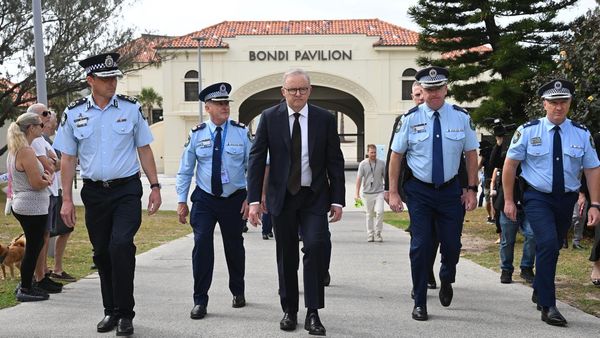
If you’re planning to take a child to Brisbane’s new blockbuster exhibition Fairy Tales, I suggest going yourself first to check it out. How’s your kid with dripping blood, gnarly toenails and inflatable sex dolls?
Fairy Tales – now on at Brisbane’s Gallery of Modern Art (Goma) – features more than 100 works of art, comprising sculpture, installation, painting, photography, animation, video art, and film props and costumes. Weird and wonderful in the way all cautionary tales should be, it is thought-provoking and very much aimed at adults – though we should never underestimate the appreciation children have for fear and wonder.
There’s plenty of both in Fairy Tales, a show that traces an artistic history of European fables and folklore – both their kaleidoscopic fantasies and their eldritch horrors. Entering the exhibition, the white walls of the gallery start to slip away as tree branches push through with violent force. A splintered, bulging wooden installation by Brazilian artist Henrique Oliveira forces visitors to dodge jutting branches while inhaling the sweet smell of the freshly cut Brazilian plywood and locally sourced driftwood.

“The idea of the woods is they are uncontrollable environments, and they push you to go on a quest for adventure,” says curator Amanda Slack-Smith. She points to Charles Perrault, the 17th-century author considered the founder of fairytales in the French court for his stories – among them Little Red Riding Hood, Cinderella and Sleeping Beauty. Perrault, she says, regarded the woods as a metaphor for “ill intent” lurking in the streets awaiting vulnerable young ladies.
Beyond the forest, we see the oldest work in the exhibition, Gustave Doré’s 1862 oil painting Little Red Riding Hood, in bed with a wolf wearing grandma’s bonnet. It is the moment before he devours her. Alongside is American artist Kiki Smith’s 2002 feminist retelling of the same story, Born, a lithograph print with the little girl and grandma rising up out of the wolf’s belly, unscathed.

A few steps away, two red concave mirrors by Anish Kapoor – a 2018 work titled Red and Black Mist Magenta – send visitors reeling.
“Whoa, that is too much,” said one woman rushing away from it. In the reflection, your face might leap out at you – or suddenly you are upside down or tiny, with other visitors looming behind. You need to stand very still if you don’t want to fall. “Mirrors in fairytales sometimes tell you you’re not worthy,” says Slack-Smith. She’s not wrong.
One of the highlights of the exhibition is American artist Trulee Hall’s Witch House (Seance of the Umbilical Coven). It is a full-sized hut covered in slimy-looking black tree roots – or worms, perhaps. Visitors enter one at a time. “The artist says it is a clubhouse for witches,” says Slack-Smith.
Inside is lit with small flickering candles and decked out with black dreamcatchers, upside down baskets, black fur, more worms and, perversely, inflatable black sex dolls. A video shows unspeakable things coming out of an orifice; a seance is under way.

It is possibly the most disturbing part of an exhibition already brimming with nightmare fuel: images of anguished lost children, long human hair with a mind of its own, poisonous mushrooms, or post-coital trolls enjoying a tender, sleepy cuddle.
Some of the more delightful parts of Fairy Tales include scenes from a child’s bedroom imaginings. The enormous Jim Henson puppets from Spike Jonze’s film Where the Wild Things Are look huggable (don’t even think about it), and David Bowie’s costume from his 1986 film Labyrinth is also … huggable. “I’m pretty sure some of his DNA is in this costume,” jokes Slack-Smith. “Don’t tell me otherwise.”

The most playful piece is a papercut animation titled You Were in My Dream. Made by Australian artists Isobel Knowles and Van Sowerwine, it invites visitors to place their face into an oval hole, and find themselves immersed in a series of short adventures. You are a child pursuing an appealing rabbit through the woods, only to be transformed into a panting dog, and then a wolf and … oh dear. You can expect the worst but good things happen too.


Play is embedded through the exhibition. There are dishy details from fairy tale films – like the 27-kilogram wedding dress that Julia Roberts wore in the Snow White adaptation Mirror Mirror, so heavy she corked her thigh trying to walk in it. Also striking is Patricia Piccinini’s installation Enchanted Field, a hanging garden in a powder-pink gallery filled with gentle characters and mushroom rings.
I could have stayed in Piccinini’s room all day, but Cinderella beckoned from the next gallery – a black-and-white silent film Cinderella that offers a decidedly more macabre take on the fantasy. Released in 1922 by German animator Lotte Reiniger, it comes complete with blood dripping from feet butchered to fit the glass slipper. In the same room, we see Hans Christian Andersen’s delicate papercuts and a mischievous Pinocchio in his Y-fronts by Australian sculptor Ron Mueck, as well as Del Kathryn Barton’s short but soul-shaking animation The Nightingale and the Rose, in which a delicate bird with huge female breasts and rosy-red nipples impales itself for love. Ouch.
These works hold the duality of fairytales; they’re either “provocatively subversive or trivially traditional,” says gallery director Chris Saines. “They were originally told to terrify children out of wandering into the forest in pre-industrial Europe but since then they have furnished a slate of big-budget films and been told and disrupted by artists and storytellers to intrigue us and unnerve us.”
Much like its subject, the exhibition is a dreamlike experience. Memories will flutter past you like moths, or you might emerge feeling cracked like an old mirror. It may not be happy ever after but you could leave transformed.
Fairy Tales is on at Goma until 28 April 2024. Guardian Australia travelled to Brisbane as a guest of Qagoma







